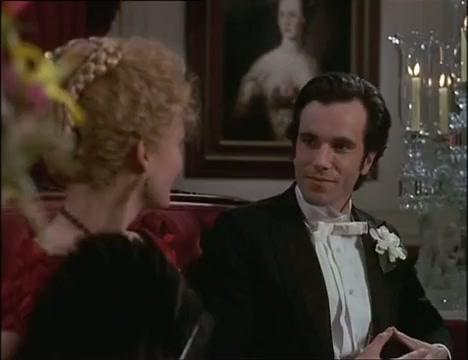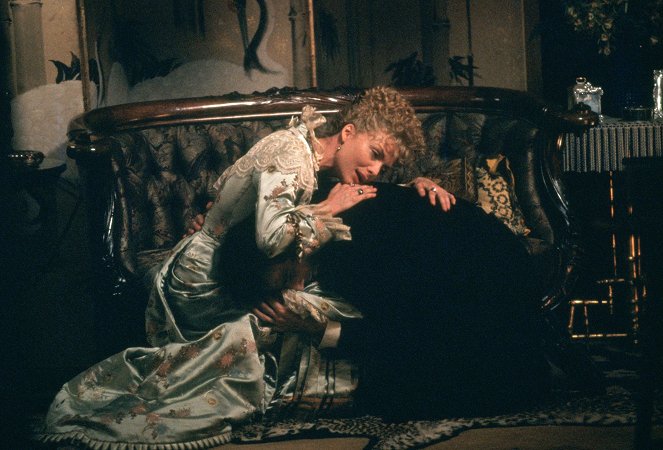Regie:
Martin ScorseseKamera:
Michael BallhausMusik:
Elmer BernsteinBesetzung:
Daniel Day-Lewis, Michelle Pfeiffer, Winona Ryder, Richard E. Grant, Alec McCowen, Geraldine Chaplin, Mary Beth Hurt, Stuart Wilson, Howard Erskine (mehr)Streaming (4)
Inhalte(1)
New York um 1870: In der feinen Gesellschaft der Stadt ist es üblich, nur mit seinesgleichen umzugehen. Dies gilt auch für den jungen Anwalt Newland Archer, der kurz vor der Eheschließung mit May Welland steht, einem unschuldigen Mädchen aus erstklassigem Hause. Doch die Ankunft ihrer unkonventionellen Cousine Ellen Olenska wirft Archer aus den gewohnten Upper Class-Bahnen. Er verliebt sich leidenschaftlich in die schöne Frau ... (ATV2)
(mehr)Videos (1)
Kritiken (10)
Ein mit dem Pulitzer-Preis ausgezeichneter Roman diente als Vorlage für dieses wunderschönes Kostüm-Melodram, das in einer Zeit spielt, in der die Moral über allem steht. Die schönen Zeiten des boomenden New York werden durch die wunderbaren Leistungen der Schauspieler verschönert. Day-Lewis und Pfeiffer lieben sich mehr, als ihr Jahrhundert ertragen kann. Und die arme kleine Frau Ryder muss das alles mit ansehen, ohne etwas zu verraten. Das langsame Tempo passt zu der dargestellten Zeit, für jeden Besuch im Salon oder in der Oper bleibt genügend Zeit, und Sie können nur eines: sich ergreifen lassen.
()
Aus persönlichen Gründen kann ich nicht mehr als mit fünf bewerten. Auch wenn für mich Zeit der Unschuld nicht mehr so aktuell ist wie vor einer gewissen Zeit, so gilt dies jedoch auch weiterhin. Scorsese hat ein zeitloses Werk gedreht, das sich auf die hervorragenden Leistungen der Hauptdarsteller stützt. Daniel Day-Lewis ist schon an sich eine Garantier für einen guten Film, Winona Ryder ist in ihrer Rolle einfach perfekt, und Michelle Pfeiffer schließt diesen schmerzreiche Dreieck mit einer emotiven Leistung ab.
()
“I want, and I can’t.” More than two hours of filmmaking elegance at a level that few directors manage to achieve. I didn’t get the impression that the plot was conventional and that only the rendering of it was extraordinary. Both aspects are beyond the average and both logically complement Scorsese’s filmography. Though The Age of Innocence is actually another one of his films about violence and organised crime, the violence and crimes in it are hidden, unmanifested. The rules of behaviour are determined by clans, though not mafia clans in this case, but familial clans. Those who do not want to lose their prestige, as if anything else mattered, must not mention that fact, nor can they even think it. The characters harm themselves with words, or rather by avoiding words. As in the book on which the film is based, their true intentions and repressed desires are revealed to us by an honest narrator, a physically absent yet omnipresent guide to the now so distant world of the New York upper crust in the late 19th century. The narrator says what the characters dare not say. Together with the setting, she speaks for the silent protagonists (I had assumed that sophisticated work with colour, props and blocking had gone extinct along with classic Hollywood – fortunately that is not the case). In the diegetic world, Countess Olenska takes on the role of a woman who does not intend to conceal the state of things as she has come to recognise it. She does not want to be another victim of social conventions, another obedient, loving wife. However, she doesn’t have immunity to protect her from the impact of her frankness. The power to save her belongs to Newland, who is consumed from within by the necessity of choosing between a woman who speaks the truth and a woman who says only what is appropriate. Thanks to the narrator, the (post-)modern narrative techniques (letters read to the camera, the director’s self-reflexive cameo as a photographer, the one who records the lives of the characters) and the careful guidance of our attention (through music, making words visible and the moderate use of close-ups and “archaic” curtains), we clearly and comprehensibly learn more about the characters than the period and setting in which they lived allowed them to learn about themselves. More than relationship dramas that focus primarily on the surface without looking beneath it, The Age of Innocence rewards us for the attention that we give it. And it does so without losing any of the emotional power of the story about the violence that we still commit every day. We just don’t talk about it so openly anymore. Of Martin Scorsese’s films, I currently consider this one to be his best. 90%
()
Though Martin Scorsese had never dabbled in the genre of sad romance, either before or since, he did a great job with this period piece. The dialogue between the main trio is both painful and uplifting, and if it wasn't for the slow pace, which is a bit too generous, this drifting ship would have sailed even further.
()
It is clear to me why this film from Martin Scorsese’s filmography is not talked about much. In terms of its story, The Age of Innocence is unbelievably boring, and the only thing that salvages it is the way Scorsese filmed it. Michelle Pfeiffer’s story might have been the most interesting thing in the whole movie. But that’s still not enough to turn this into a good film. Just imagine that the movie you’re watching is not set in New York but in the English countryside and the level of its blandness becomes clear. This movie aspired to give me a visual brain lobotomy.
()



Werbung